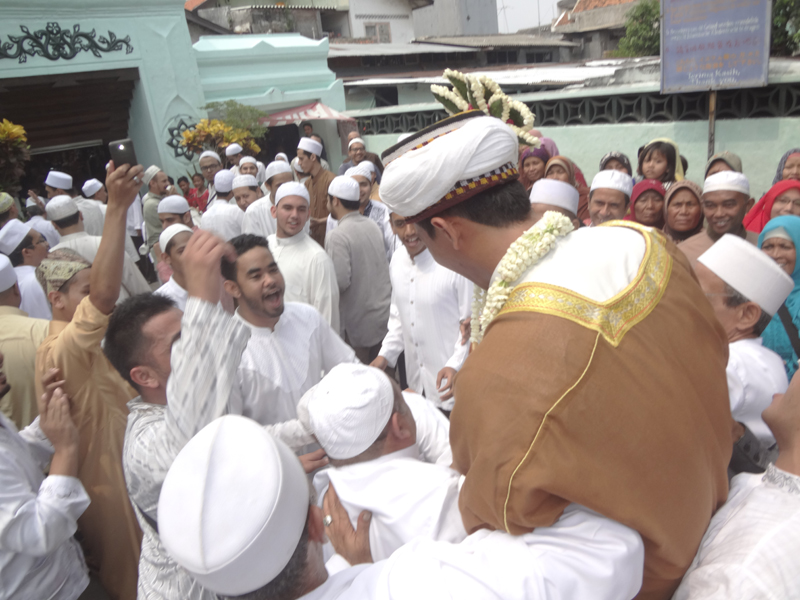
Nature has its own ways to ruin a lazy Sunday morning in the kampung. Insensitive to the tranquil morning quiet, the neighbors’ pet birds and chickens made a lot of noise, forcing me to open my eyes and half-heartedly looked at my watch which had lied laid next to me all night. That day, I would attend my best friend’s wedding. Ahmad, my friend of Arab descent, is going to marry a girl from the neighborhood. After freshening up I put on the same shirt that I had worn to a relative’s wedding last night, one of so many similar events that I had already attended in the last month.
It seems Surabaya was enjoying the festivity of a wedding season.
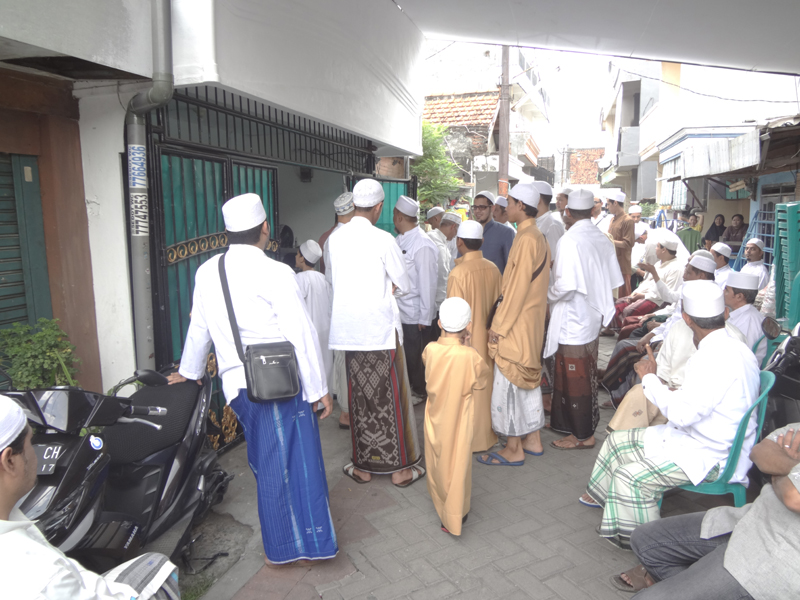
Guests and relatives waited for the groom to get ready.
I grabbed two slices of bread on my way out the door with Abi, my father and creative collaborator. KH Mansyur Street seemed quiet and calm. Shops are usually closed on Sundays, leaving the streets empty and dusty, just like in a John Wayne movie. My Abi raised his open hand parallel to his head each time he greeted friends and acquaintances that we came across along the way to the groom’s house, behind Ampel Mosque about half a kilometer from my house.
Approaching our destination, we heard the festive sounds of friends and family who had flocked to Ahmad’s house. Traditional snacks and Arabian coffee flowed freely. Only male guests were welcome here while female guests gathered at the bride’s residence.

A Hadrah band cleared a path for the groom and his crew.
I shook hands with some familiar faces and we shared stories while sipping coffee served on a silver tray from a table covered in green cloth. In the corner of the room a few Hadrah (a tambourine like instrument) players were rehearsing. I heard some shouts and laughter, a real festivity indeed.
The groom’s friends and family prepared to walk to the bride’s house where the nuptials would take their vows. Along the way, the groom was targeted as the object of gojlokan (hazing). It resembled hazing for high school freshman and it is one of many wedding traditions in our culture known as gandaran.
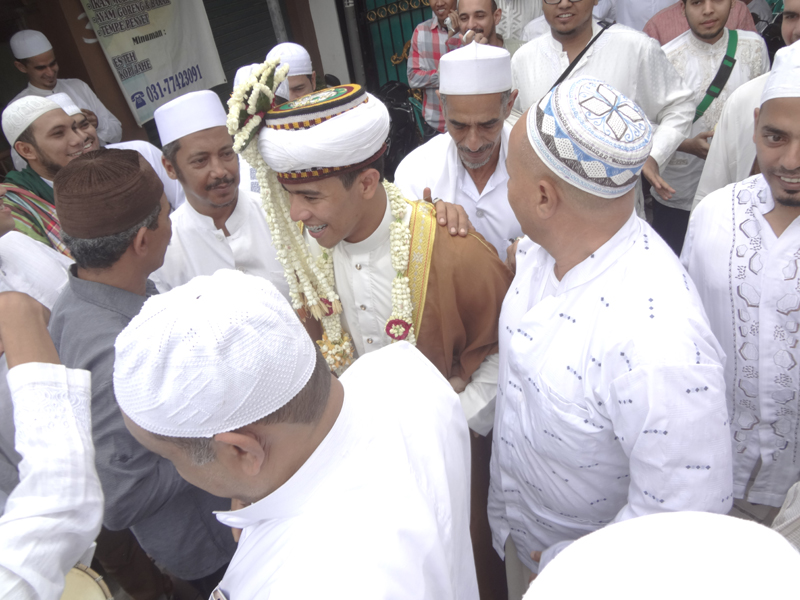
The groom receives blessings and prayers.
Soon the noise inside grew louder and louder as the groom prepared to leave. Ahmad looked neat and dapper for a young guy. He wore a golden brown coat, white shirt, turban, and a jasmine garland around his neck. His face was sweaty but he looked radiant nevertheless. The Hadrah band started pounding the rebana and terbang to clear a path for the groom. Prayers and songs brought the still, humid air to life. Family and friends could be found all around Ahmad, greeting him, hugging and kissing him on both cheeks to congratulate him.
Ahmad commenced his journey along a route arranged by the group leader. The leaders usually select the longest routes in order to prolong the hazing. Unexpectedly, the leader took a shortcut by going through the Ampel mosque. Imagine how crowded the place was, full of pilgrims on a Sunday.
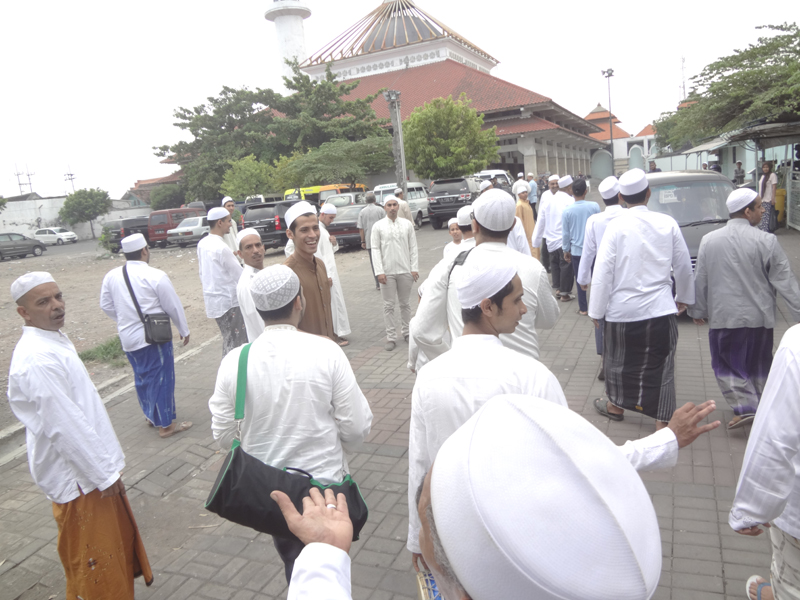
The group changes direction and enters the religious area of Ampel Mosque.
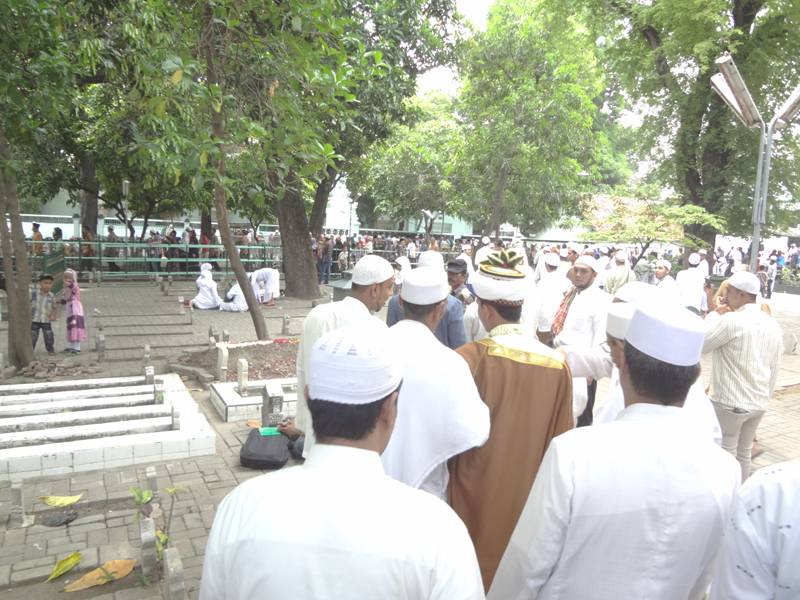
The group passed by the graveyard at Ampel Mosque.
Ah, don’t give a damn about the pilgrims or their cries or prayers.
The Hadrah group stopped playing for a while to respect the mosque but the crowd still made a lot of noise,screaming at each other. One of the older members of the group grabbed Ahmad by the hand and took him to the side of the road where there were old clay pots with water provided for pilgrims. The old man took a glass of water from the pot and gave it to Ahmad as if he knew his nerves made him thirsty. All around pilgrims documented the not so every day moment with their cameras.
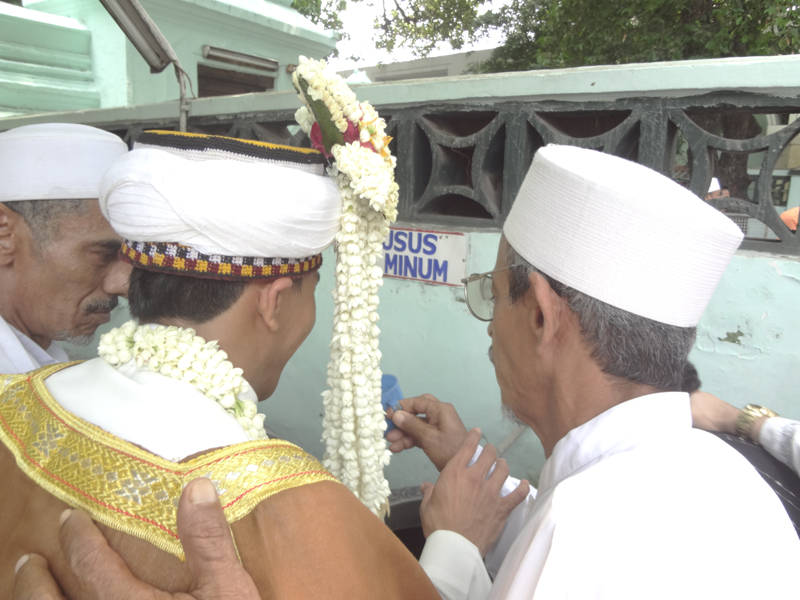
A senior member of the group gave water to the groom who was both thirsty and nervous.
The younger members of the group started hazing Ahmad by offering him up to the pilgrims for photos. Ahmad simply could not refuse and ended up embarrassed. Some other group members asked Ahmad to perform the Samar dance and lifted his body from behind without warning. He rose above the crowd as his fans cheered him on.
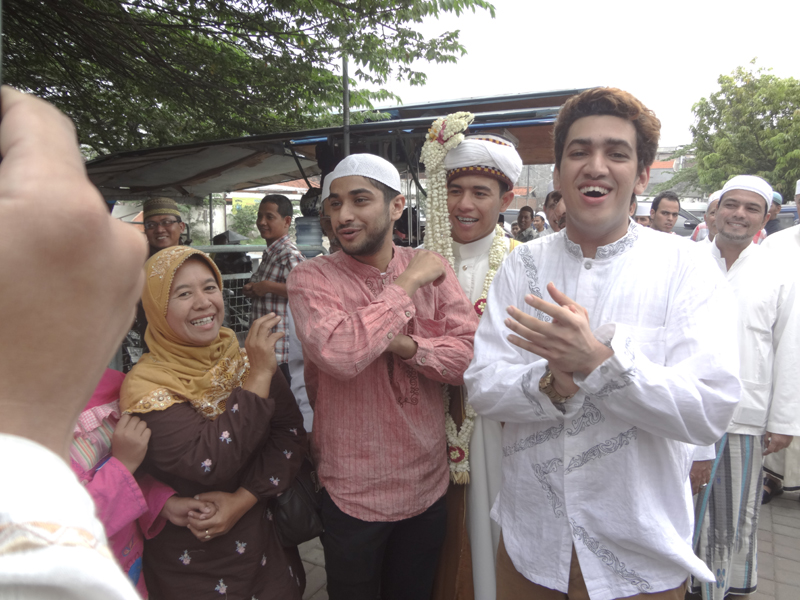
A few pilgrims took photos with the groom.

The groups caught the groom off guard as they lifted him up.
“Awas koen yo! (You all will pay for this!)” shouted Ahmad as he suffered through the embarrassment.
He was then escorted to the information hall at the mosque and asked to sign his name in the guest book. He shook hands with a mosque caretaker who was clearly confused about what was going on.
And that is how our Arab community treats a groom. The level of intensity of the hazing may vary, depending on the groom’s popularity.
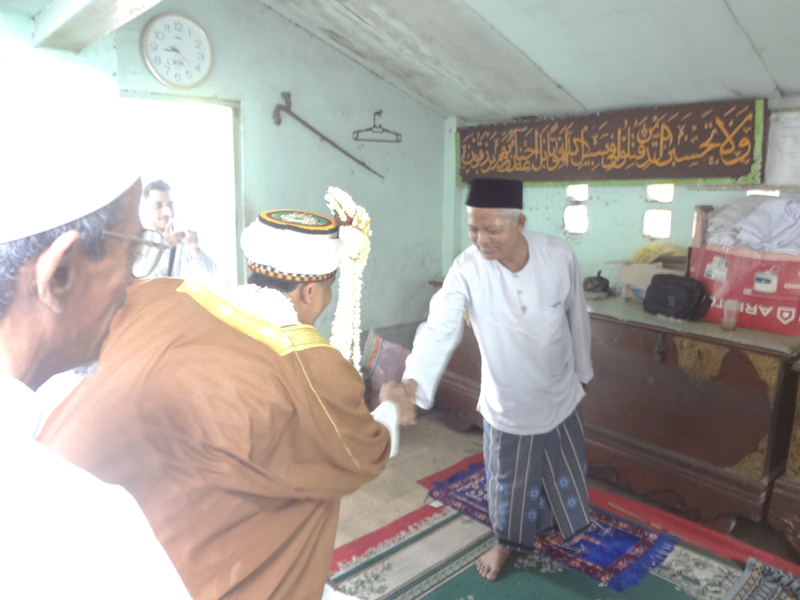
The mosque caretaker could only smile as he shook hands with the groom.
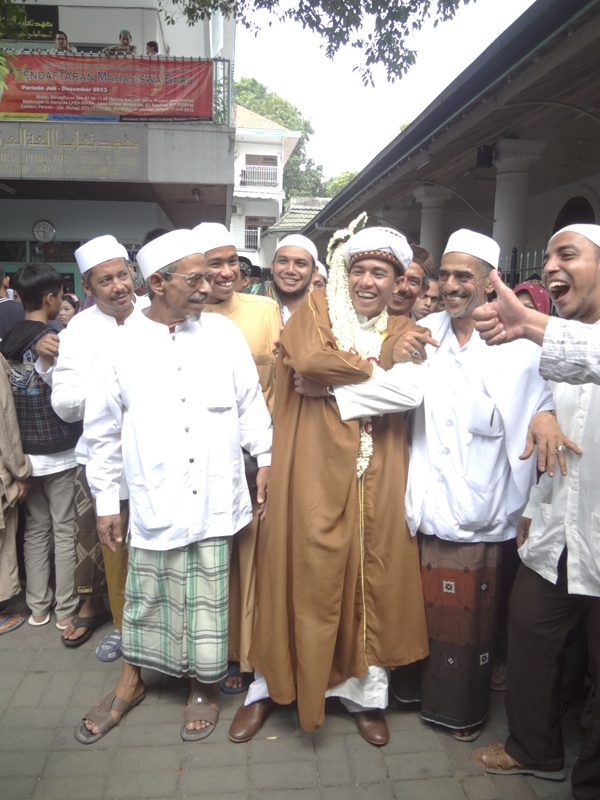
The groom stroke a pose, though begrudgingly, in order to avoid a more severe hazing.

The group leader led the crowd through Pasar Gubah (Holy Ampel).
Upon entering Ampel market, we walked for 50 meters and arrived at an alley in front of the bride’s home. The group stopped for a while to tidy up the groom’s appearance which had become messy from the hazing. In turn, they wiped away the sweat on Ahmad’s face while an elderly member of the group gave Ahmad a last piece of advice before stopping at the house.
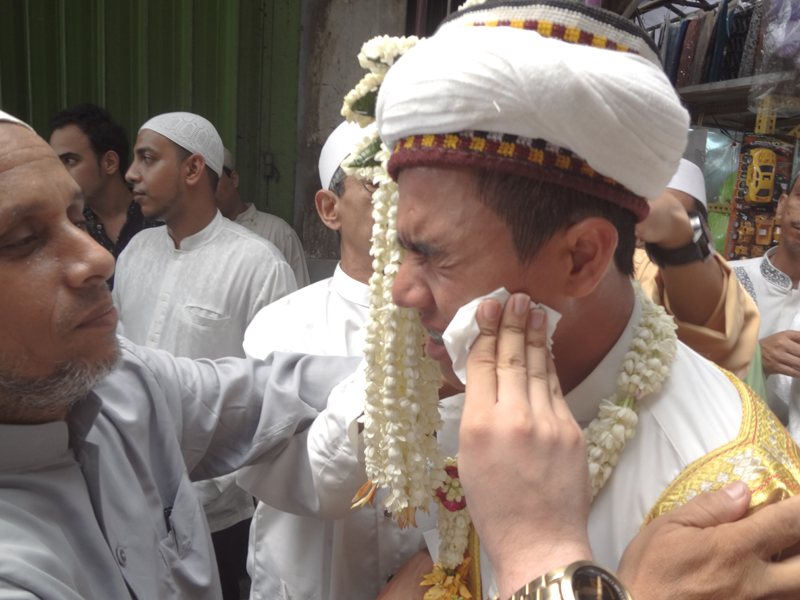
Some group members helped the powerless groom to fix his looks after the hazing.
Suddenly a solemn silence filled the air, sweeping away all the pranks and excitement that had thus far energized the wedding day. This was the moment for parents to actually let go of their son and daughter. To the bride and groom, such an event made them realize the end of one life phase, when they must stop fooling around and leave their friends behind for each other. It was time for them to grow up and face the real world.

The group entered the bride’s neighborhood.
The groom entered the bride’s living room which was transformed into the ceremonial center. We all followed him. The bride and groom’s older relatives, a religious leader, and a witness sat on the floor. It was quiet, unlike the rowdiness that preceded just minutes ago. Koran verses were chanted and bride and groom took their wedding vows (ijab nikah). The groom then shook hands with the Wali, the father of the bride.
Stillness. Such an event always gives me goose bumps.

Someone documenting the moment when the groom took his vow at the bride’s home.
Immediately afterwards the groom shook hands with his new father-in-law and other elderly family members. He paid respect by kissing their hands. With this act he had become an integrated part of the big family.
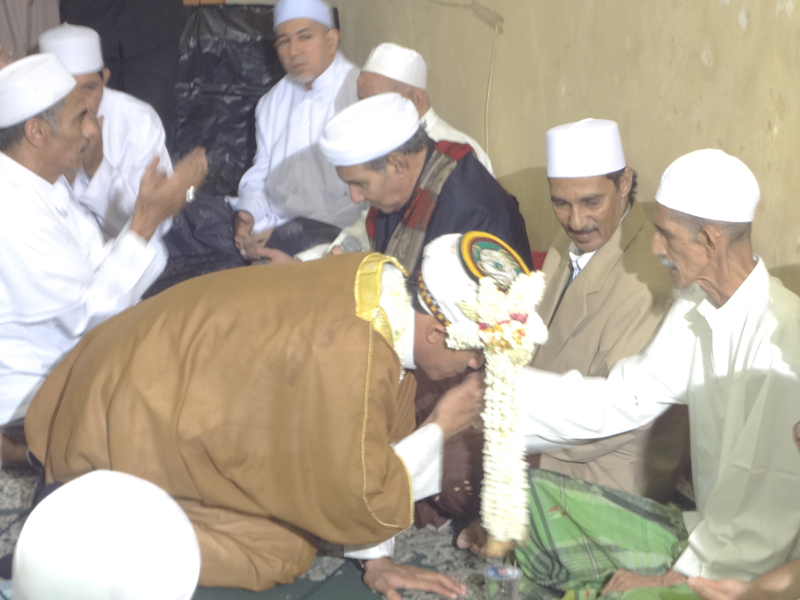
The groom kissed the hands of some of the bride’s elderly relatives.
Outside the house, food started to circulate for the guests. Guests voluntarily stood up making a long line to distribute bowls from the kitchen to the last line of hungry guests. Nasi Mandi was on the menu. It is a traditional meal made of rice cooked with spices and mutton seasoned with pickled pineapples. Water and oranges were also served to complete the wedding ritual in Kampung Arab that Sunday afternoon.
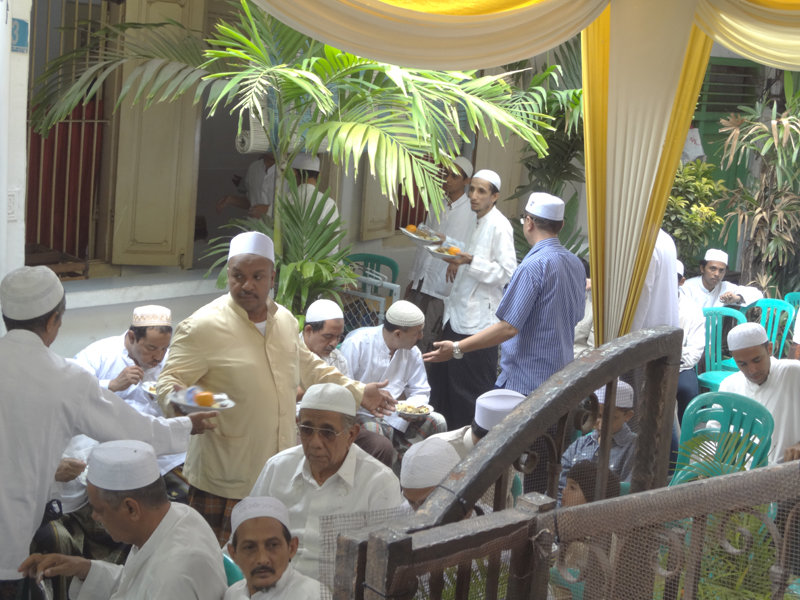
Guests voluntarily made a line to distribute food to other guests.
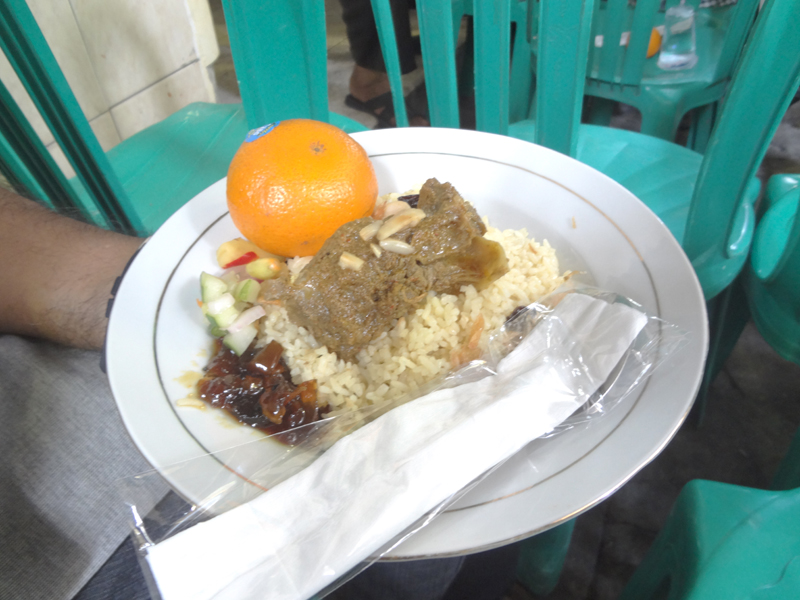
Yum! Nasi Mandi concludes the wedding ceremony.
After Ahmad, I wondered, who will be the next to follow in his path. The question crossed my mind as I walked home from the event.
Translated from English to Indonesia by Vivin Nofrina, edited by Matt Borden.
This post is also available in: Indonesian



